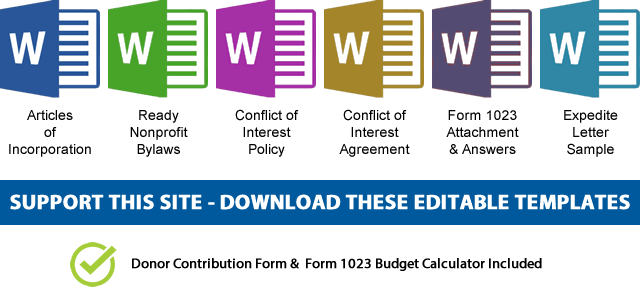What is nonprofit Fiscal Sponsorship or a 501c3 Fiscal Sponsor?
 Nonprofit Fiscal Sponsorship or having a 501c3 Fiscal Sponsor is the act of operating a nonprofit project under the umbrella of an established 501c3 tax-exempt organization without the need for applying for tax exemption for a short term.
Nonprofit Fiscal Sponsorship or having a 501c3 Fiscal Sponsor is the act of operating a nonprofit project under the umbrella of an established 501c3 tax-exempt organization without the need for applying for tax exemption for a short term.
Operating a nonprofit project under a fiscal sponsorship model ensures that donations to the non-exempt group are tax deductible for donors, and at the same time, the sponsoring nonprofit organization takes financial and legal responsibilities of its subordinate sponsored project through it’s established tax exemption status.
There are pros and cons to fiscal sponsorship for nonprofits and navigating the compliance issues makes it impractical for almost every scenario. Almost in all cases it’s advisable to apply for tax exemption rather than going the fiscal sponsorship route. Here we discuss the possible issues and benefits of nonprofit fiscal sponsorship.
Can a nonprofit have a fiscal sponsor for its projects?
Having a nonprofit fiscal sponsor for tax purposes may seem like renting a car. It gives you a vessel to get from point A to B without actually buying the car and having the rental company taking care of the maintenance, support, and other issues.
Unfortunately fiscal sponsorship of a nonprofit project is not that simple as it involves strict compliance with IRS rules and regulations, and could backfire for the sponsoring organization and the sponsored entity. The notion that you can hit the ground running with fiscal sponsorship is simply not true as even the smallest charitable fundraising effort should be coordinated and approved by the 501c3 fiscal sponsor ahead of time.
And just like renting a car, you can’t do whatever you like with it, it’s not free, and you get what you pay for.
How does a nonprofit get sponsored by a fiscal sponsor?
In order to be sponsored by a tax exempt 501c3 organization in order to apply for grants, receive tax deductible contributions and public support; a group, a project, or a new nonprofit corporation should meet the exempt purpose of the sponsoring organization.
For example, let’s say that you have a nonprofit project in mind for cleaning the oceans. You’d like to apply for grants and receive charitable donations from the general public to support your project, however, no one seems to want to support your cause because their charitable donations are not tax deductible.
In this case you have the choice to apply for tax exemption yourself or would have to find an existing 501c3 tax-exempt organization with the same mission, and ask them to use their tax exemption status for your fundraising, hence becoming your 501c3 fiscal sponsor.
The potential problems of finding fiscal sponsorship are:
- Finding a suitable exempt nonprofit organization to sponsor and support your project or projects. Not even mentioning that since the mission should be the same, there are possibilities that the organization you’re approaching already does what you’re proposing,
- convincing them that your projects are worthwhile, beneficial to the public, and further the exempt purpose of the sponsoring organization,
- and convincing them to vouch for you and take up all the legal and financial responsibilities on your behalf.
How much does nonprofit fiscal sponsorship cost?
Since the 501c3 fiscal sponsor is required and obligated by the IRS to take up all the legal and financial burdens, all fiscal sponsors charge a fee for their services. Whether it’s a just fee or not, the actual project foots the bill out of the public donations and potential grants which makes it unattractive in the eyes of the donors.
For example, it’s not uncommon for a 501c3 fiscal sponsor to charge 10-20% of total revenue of sponsored projects and while it might seem reasonable in their eyes, it’s outrageous in donor’s eyes as they want all their donation to go towards the cause.
If a project’s proposed revenue is $100,000, and the 501c3 fiscal sponsor takes their 15% cut, the project is left with only $85,000 net revenue. Out of this $85,000 they may allocate a further 15% to their operation and overhead cost and that’s where it gets shameful. Meaning out of every dollar that a donor made in their support, only 72 cents will go towards that actual deed which is a deal breaker for most donors.
Fiscal Agent Vs. 501c3 Fiscal Sponsor and their differences
A fiscal agent is different than a nonprofit fiscal sponsor. A nonprofit fiscal sponsor as its name suggests is a nonprofit tax-exempt organization under the section 501c3 of the internal revenue code. A fiscal agent can be a bank, a trust, or even another tax-exempt entity. (Not all exempt organizations can receive tax-deductible charitable donations).
The job of a fiscal agent is collection and administration of the funds (public donations or grants) and the element of control is absent from this agreement. To simplify it even more, a single person can be considered a fiscal agent as long as that person is in charge of your financial administration for a fee. Fiscal agents are usually hired entities because the budding organizations can’t or don’t feel comfortable doing their own financial administrative work.
What is a nonprofit fiscal sponsorship agreement?
When an unincorporated (or incorporated) project enters into an agreement and arrangement with a tax-exempt 501c3 organization for the sole purpose of receiving tax-deductible charitable donations through the exempt status of the said organization, the sponsoring organization will have financial and fiduciary duties on behalf of the project.
In order to be IRS compliant and not lose their own tax exemption status, nonprofit fiscal sponsors have to retain absolute control over every facet of their sponsored projects, and this is where it gets tricky. When it comes to fiscal sponsorship agreement, the 501c3 fiscal sponsor has the upper hand in every aspect of the negotiations and you basically accept their terms or walk away – you have no say-so in anything.
Fiscal sponsorship guidelines & responsibilities of a nonprofit fiscal sponsor
In order to stay compliant with IRS, when a non-exempt group or entity enters into fiscal sponsorship agreement with an exempt 501c3 organization, both parties have to follow the IRS guidelines and rules to ensure the charitable donations stay tax deductible or unrelated business income tax and hefty fines will follow.
Nonprofits who act as fiscal sponsors should maintain absolute control over the donated funds and distribution of donated funds while providing their resources and services. This element of “control” is crucial to keep the IRS happy and maintaining the contributions to the 501c3 fiscal sponsor tax-deductible.
Pros & Cons of nonprofit fiscal sponsorship
There are superficial and perceived benefits to the business model of fiscal sponsorship such as becoming tax exempt overnight, but it’s rarely the case.
As I mentioned earlier, the fiscal sponsor is responsible for all legal and financial duties of the sponsored project and with that responsibility comes absolute discretion and control. This is where the problems of fiscal sponsorship start to show their ugly heads as I’ve seen more headaches and bad blood between these two parties than any other venture.
- It’s not uncommon (very common actually) for 501c3 fiscal sponsor organizations to decide to sit on the funds and release them dollar by dollar for whatever reason they see fit or not at all.
- Fiscal sponsorship agreement or not, the revenue received through fundraising, grants and charitable contributions on your behalf is fiscal sponsor’s money really and not yours. The funds that were supposed to be earmarked for your use could sit and never be released for one reason or another. It’s a real possibility that you could end up with nothing and the project may never get off the ground.
- Most fiscal sponsorship agreements will have clauses to prevent you from taking legal action against your sponsor. You could try to sue the fiscal sponsor but you will most likely lose. Worst case scenario for them, they can just return the funds to the donors and still charge you the fees.
And most importantly, by entering into a fiscal sponsorship agreement, you lose the benefit of the doubt in the future if you ever decide to apply for tax exemption. Let me explain:
When you apply for tax-exemption using the form 1023, you have to provide financial information for your past years, current year, and at least two succeeding years in a form of budget projection. If you already operated under another organization and were fiscally sponsored, that becomes your past.
IRS is lenient towards new organizations with no financial history and gives them the benefit of the doubt as they review their applications. However the IRS examiners will take a much closer look at your financial information if you have something to report from your fiscal sponsorship adventure and worst still, if the venture was a failure on some level as most fiscally sponsored projects are.
- Fiscal sponsorship will cost you much more in one year of operation as a sponsored project than actually applying for tax exemption yourself. Just a simple attorney fee to draft your fiscal sponsorship agreement will cost you more than applying for tax exemption yourself!
- Your own tax exemption cuts the middleman and puts you in control of your own dreams and aspirations rather than having a nanny looking over your shoulder 24/7 and dictating what you can or cannot do.
Conclusion
Take my advice for what it’s worth and don’t even think about 501c3 fiscal sponsorship unless the sponsoring organization is 100% vetted and trustworthy, and even then, fiscal sponsorship is a bad idea all around.
 NOTE: If you’d like to receive the following organizing documents:
NOTE: If you’d like to receive the following organizing documents:- Nonprofit Articles of Incorporation,
- Nonprofit Bylaws,
- Nonprofit Conflict of Interest Policy,
- Conflict of Interest Policy Acknowledgment,
- Form 1023 Attachment with all the answers,
- Form 1023 Expedite Letter template,
- and Donor Contribution Form
in Microsoft Word Document format, please consider making a donation and you’ll get to download them immediately. Not only they're worth well over $1000 in value, they will save you weeks of copy pasting and formatting as they are ready to go templates which only need changing names and addresses.

